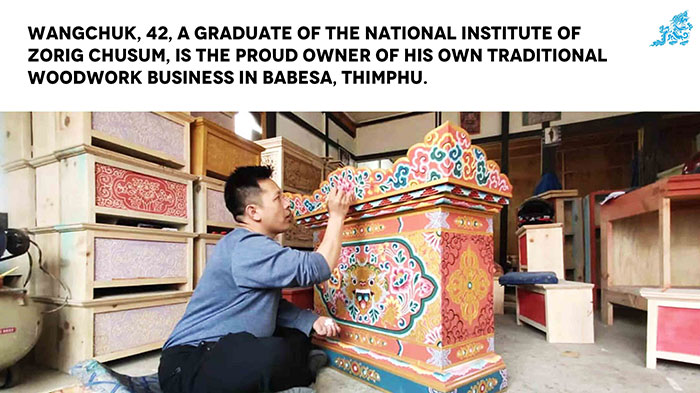Chhimi Dema
Who said there is no future or money for graduates of vocational or technical training institutes? Ask Wangchuk.
Wangchuk, 42, a graduate of the National Institute of Zorig Chusum, is not only a successful entrepreneur, but his skills has seen him and his 12 employees through the pandemic. The only hindrance to his work or income was that he lost two months of working time.
Wangchuk, 42, from Wangdi, runs a traditional woodwork business in Babesa, Thimphu. His business specialises in patra (wood carving), lhadri (painting) and shingzo (carpentry). He makes choesham (altar), zhugthri (throne), chodom (hand craved tables) and other traditional furniture. At his small workshop that also functions as the showroom, near the expressway, there are choeshams, thris, chodoms and many more that are waiting for the last touches. All the goods were ordered, says Wangchuck with satisfaction in his voice. His furniture are sold from as less as Nu 3,000 to Nu 500,000.
“It is going well,” says Wangchuk who used to export to countries like Taiwan, Singapore and Vietnam.
After graduating from the Zorig Chusum institute in 2006, Wangchuk had worked in eight furniture houses before he opened his Radak Puensum Traditional Wood Works in 2015.
The graduate in lhadri (painting) learned carpentry from his friends. He brought in his friends who were good at carving, painting and carpentry. Today there are 12 people working for him.
“Before 2015, I was hardly earning anything. I did not even have a taxi fare to travel,” Wangchuk recalls. Wangchuk is modest in calling himself a successful entrepreneur. He has bought a pickup truck and “can manage to help my family and relatives.”
Wangchuk has seen the opportunity for people with skills. He wants to help young people acquire skills if they are ready to dirty their hands. However, he sounds disappointed. “Not many are showing up or are interested,” he says.
Wangchuk believes that the educated can find jobs. “The semi-educated or the illiterate will have to build skills.”
Ready to help curious walk-in customers, Wangchuk feels there is a huge scope in carpentry, especially making traditional furniture. With families becoming nuclear and everybody wanting to live independent lives, Wangchuk feels his market is secure.
Wangchuk has one simple yet powerful business principle. He will not take too many orders to ensure that his clients are not disappointed. “Sometimes I have to reject orders because I have to live up to what I agreed with my clients,” says Wangchuk.


